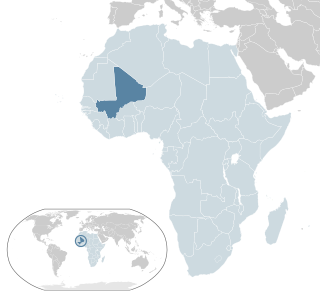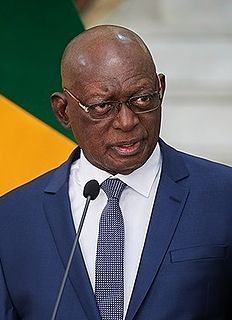
Until the military coup of March 22, 2012 and a second military coup in December 2012 the politics of Mali took place in a framework of a semi-presidential representative democratic republic, whereby the President of Mali is head of state with a Presidentially appointed Prime Minister as the head of government, and of a multi-party system.

Amadou Toumani Touré is a Malian politician who was President of Mali from 2002 to 2012.

Elections in Azerbaijan gives information on election and election results in Azerbaijan.

Elections in Niger take place within the framework of a semi-presidential system. The President and National Assembly are elected by the public, with elections organised by the Independent National Electoral Commission (CENI).
The Sudanese Union – African Democratic Rally was a political party in Mali.

Ibrahim Boubacar Keïta, or as he is often known, IBK, is a Malian politician who has been President of Mali since 2013. Previously he was Prime Minister of Mali from 1994 to 2000 and President of the National Assembly of Mali from 2002 to 2007. He founded a political party, Rally for Mali (RPM), in 2001. He was elected as President in the July–August 2013 presidential election and sworn in on 4 September 2013.
The National Congress for Democratic Initiative is a political party in Mali, founded in 1990 and led by Mountaga Tall.

Jeanine Antoinette Hennis-Plasschaert is a Dutch politician and diplomat serving as Special Representative of the Secretary-General for the United Nations Assistance Mission for Iraq since 1 November 2018. She is a member of the People's Party for Freedom and Democracy (VVD).
Mountaga Tall is a Malian politician who is President of the National Congress for Democratic Initiative (CNID) and served in the government of Mali as Minister of Higher Education and Scientific Research from 2014 to 2016 and Minister of the Digital Economy and Communication from 2016 to 2017. Previously he was First Vice-President of the National Assembly of Mali from 2002 to 2007.
The Rally for Mali is a Malian political party created by Ibrahim Boubacar Keïta in June 2001. In 2013, Keita was elected President of Mali following several attempts, and the party took first place in parliamentary elections, winning 66 seats, although not enough for a majority.

The National Assembly of Mali is the unicameral country's legislative body of 147 voting members.
Younoussi Touré is a Malian politician. He was Prime Minister of Mali from 9 June 1992 to 12 April 1993 and was the first Prime Minister appointed under President Alpha Oumar Konaré. Touré was the President of the Union for the Republic and Democracy (URD), a political party, from 2003 to 2014. He was First Vice-President of the National Assembly from 2007 to 2012 and President of the National Assembly from 2012 to 2013.

Dioncounda Traoré is a Malian politician who was President of Mali in an interim capacity from April 2012 to September 2013. Previously he was President of the National Assembly of Mali from 2007 to 2012, and he served as Minister of Foreign Affairs from 1994 to 1997. He was President of the Alliance for Democracy in Mali-African Party for Solidarity and Justice (ADEMA-PASJ) beginning in 2000, and he was also President of the Alliance for Democracy and Progress (ADP), an alliance of parties that supported the re-election of President Amadou Toumani Touré in 2007.

Parliamentary elections were held in Mali on 20 July 1997, with a second round on 3 August. They followed the April elections, which had been annulled by the Constitutional Court due to "serious irregularities". The result was a victory for the Alliance for Democracy in Mali, which won 128 of the 147 seats elected in the country, a further 13 being elected by Malians living abroad. The elections were boycotted by the National Congress for Democratic Initiative, the Sudanese Union-African Democratic Rally, the Popular Movement for the Development of the Republic of West Africa, the Rally for Democracy and Progress, the Rally for Labour Democracy, the Union of Democratic Forces for Progress and the Malian Union for Democracy and Development. Voter turnout was just 21.6%.

Parliamentary elections were held in Mali on 24 November 2013. President Ibrahim Boubacar Keïta's party, Rally for Mali, won 66 of the 147 seats in the National Assembly, with its allies winning an additional 49 seats, giving it a substantial majority. The Union for the Republic and Democracy, led by Soumalia Cissé, won 17 seats, becoming the Opposition.

The Rally for Democracy and Progress is a political party in Mali.

The 26 March 1991 Malian coup d'état resulted in the overthrow of President Moussa Traoré after over two decades of dictatorship and eventually led to multi-party elections.

Issaka Sidibé is a Malian politician. He has been President of the National Assembly of Mali since 22 January 2014. Sidibé previously served in the National Assembly from 2002 to 2007, and he was reelected in 2013. He had a career as a customs official before his turn to politics.

Parliamentary elections were scheduled to be held in Mali on 25 November and 16 December of 2018, but were moved to April 2019 due to organization problems and security concerns.












